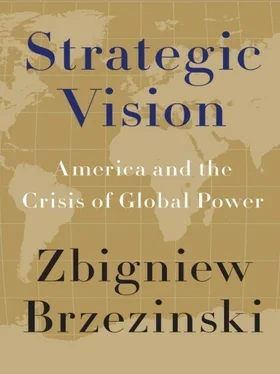Zbigniew Brzezinski - Strategic Vision - America and the Crisis of Global Power
Здесь есть возможность читать онлайн «Zbigniew Brzezinski - Strategic Vision - America and the Crisis of Global Power» весь текст электронной книги совершенно бесплатно (целиком полную версию без сокращений). В некоторых случаях можно слушать аудио, скачать через торрент в формате fb2 и присутствует краткое содержание. Город: New York, Год выпуска: 2012, ISBN: 2012, Издательство: Basic Books, Жанр: Публицистика, на английском языке. Описание произведения, (предисловие) а так же отзывы посетителей доступны на портале библиотеки ЛибКат.
- Название:Strategic Vision: America and the Crisis of Global Power
- Автор:
- Издательство:Basic Books
- Жанр:
- Год:2012
- Город:New York
- ISBN:9780465029556
- Рейтинг книги:4 / 5. Голосов: 1
-
Избранное:Добавить в избранное
- Отзывы:
-
Ваша оценка:
- 80
- 1
- 2
- 3
- 4
- 5
Strategic Vision: America and the Crisis of Global Power: краткое содержание, описание и аннотация
Предлагаем к чтению аннотацию, описание, краткое содержание или предисловие (зависит от того, что написал сам автор книги «Strategic Vision: America and the Crisis of Global Power»). Если вы не нашли необходимую информацию о книге — напишите в комментариях, мы постараемся отыскать её.
Strategic Vision: America and the Crisis of Global Power — читать онлайн бесплатно полную книгу (весь текст) целиком
Ниже представлен текст книги, разбитый по страницам. Система сохранения места последней прочитанной страницы, позволяет с удобством читать онлайн бесплатно книгу «Strategic Vision: America and the Crisis of Global Power», без необходимости каждый раз заново искать на чём Вы остановились. Поставьте закладку, и сможете в любой момент перейти на страницу, на которой закончили чтение.
Интервал:
Закладка:
The first socially inclusive but geographically limited manifestation of political awakening was the French Revolution. Its eruption was driven by a combination of atavistic rebellion from below and novel mass propagation from above. It occurred in a society in which a traditional monarchy was sustained by a politically literate but internally divided aristocracy and by a materially privileged Catholic Church. That power structure was then challenged by a politically literate but restless bourgeoisie engaged in public agitation in key urban centers and even by a peasantry increasingly aware of its relative deprivation. Historically unprecedented political pamphleteering, facilitated by the printing press, rapidly translated social resentments into revolutionary political aspirations crystallized in emotionally captivating slogans: “ liberté, égalité, fraternité. ”
The resulting violent political upheaval produced a sudden unifying surge in collective and self-conscious national identity. Napoleon’s military triumphs in the aftermath of the Revolution of 1789 owed at least as much to the collective fervor of a politically awakened French national identity as to his military genius. And that fervor spread rapidly throughout Europe, with its contagion first favoring Napoleonic victories and then contributing, in a rebound (having aroused Prussian, Austrian, and Russian nationalistic passions), to Napoleon’s defeat. But by the “Spring of Nations” in 1848, much of Europe—notably Germany but also Italy, Poland, and soon Hungary—plunged into an age of fervent nationalism and socially self-conscious political awakening. By then, the more politically conscious Europeans had also become captivated by the democratic ideals of the socially less revolutionary but politically more inspirational humanism of the distant, open, and postaristocratic American republic.
However, less than a century later, Europe fell victim to wars inspired by its own conflicting populist passions. The two world wars coupled with the explicit anti-imperialism of the Bolshevik Revolution, helped make mass political awakening a global phenomenon. The conscripted soldiers of the British and French colonial empires returned home imbued with a new awareness of their own political, racial, and religious identity and of their economic privation. Concurrently, the increasing access to Western higher education and the resulting spread of Western ideas drew the minds of those in the upper strata of the indigenous populations of European colonies to captivating notions of nationalism and socialism.
Nehru of India, Jinnah of Pakistan, Sukarno of Indonesia, Nkrumah of Ghana, and Senghor of Senegal traveled such paths from their own personal political awakening to charismatic leadership in mass political proselytization, culminating in their leadership of respective national emancipations. Japan’s sudden burst into world politics at the turn of the twentieth century also stimulated a parallel political awakening in China, then smarting under the humiliating subordination imposed on it by the European powers. Sun Yat-sen launched his quest for China’s renewal in the early twentieth century having benefited from personal observation of Japan’s self-initiated Western-style modernization; while another young Chinese, Deng Xiaoping, absorbed Marxism as a young student in distant Paris.
One of the most memorable moments in my public career occurred in 1978, when I was in Beijing to initiate secret efforts to normalize US-Chinese relations and to forge a de facto coalition of convenience against the then-expanding Soviet Union. Following the very sensitive and narrowly held negotiations with Deng, I was unexpectedly invited by him to a private dinner. As we sat in a pavilion overlooking a small lake within the Forbidden City and I quizzed him about the evolution of his own political views, he began to reminisce about his youth. Our talk turned to his expedition, as a very young student, from central China (first by a riverboat to the coast, and then by a steamer) to the then-so-remote Paris of the 1920s. It was for him at the time a trip literally into the distant unknown. He told me how gripped he became by the awareness of China’s relative social retardation compared to France and how his sense of national humiliation made him turn for historical guidance to Marxist teachings about social revolution as a shortcut to national redemption. That was when his national resentment, political awakening, and ideological formation fused into one, and came to shape his subsequent participation in two revolutions: under Mao, to break with China’s past, and then (when he became the leader) to shape China’s future. Less than a year after that memorable moment, Deng Xiaoping and his wife—in the course of the Chinese leader’s state visit to America—in a unique gesture, came to a private dinner at my home in the Washington suburbs.
Over the course of two centuries, the revolution in mass communication and the gradual spread of literacy, especially among the growing concentration of urban residents, transformed individual political awakening into a mass phenomenon. Pamphleteering and the emergence of regularly published newspapers during the nineteenth century began to stoke popular desires for political change. As people in the middle and upper classes took on the habit of regularly reading newspapers, their political awareness grew and political dialogue about the state of national affairs became a normal social occurrence. The appearance of radio in the early twentieth century then gave political oratory a nationwide reach (think of Hitler) while giving even distant events a sense of dramatic immediacy, exposing hitherto politically passive and semi-isolated peoples to a cacophony of political clamor.
The recent emergence of global television, and then of the Internet, has in turn connected previously isolated populations with the world at large, and also augmented the ability of political activists to reach out to and mobilize the political loyalty and emotions of millions. The universal connectivity of the late twentieth century transformed political unrest into a worldwide learning process of street tactics in which otherwise disparate and distant political factions can borrow tactics from one another. Slogans quickly spread from Nepal to Bolivia, as have colored scarves from Iran to Thailand, videos of suffering from Sarajevo to Gaza, and tactics of urban demonstrations from Tunis to Cairo—all promptly ending up on TV and computer screens throughout the world. Thanks to these new means of communication, mass political agitation now involves a rapid geographical leapfrogging of shared experience.
In some countries, demographic “youth bulges”—disproportionately large populations of young adults who confront difficulties in their cultural and economic assimilation—are especially explosive when combined with the revolution in communication technology. Often educated but unemployed, their resulting frustration and alienation make them ideal recruits for militant groups. According to a 2007 report by Population Action International, youth bulges were present in a full 80% of civil conflicts between 1970 and 1999. It is also noteworthy that the Middle East and the broader Muslim world have a higher than average proportion of youth. Iraq, Afghanistan, the Palestinian territories, Saudi Arabia, and Pakistan all have massive youth populations whom their economies are unable to absorb and who are susceptible to disaffection and militancy. It is in this region, from east of Egypt to west of China, that accelerating political awakening has the greatest potential for violent upheaval. It is in effect a demographic powder keg. Similarly dangerous demographic realities prevail in African countries such as the Congo and Nigeria as well as in some Latin American countries.
Читать дальшеИнтервал:
Закладка:
Похожие книги на «Strategic Vision: America and the Crisis of Global Power»
Представляем Вашему вниманию похожие книги на «Strategic Vision: America and the Crisis of Global Power» списком для выбора. Мы отобрали схожую по названию и смыслу литературу в надежде предоставить читателям больше вариантов отыскать новые, интересные, ещё непрочитанные произведения.
Обсуждение, отзывы о книге «Strategic Vision: America and the Crisis of Global Power» и просто собственные мнения читателей. Оставьте ваши комментарии, напишите, что Вы думаете о произведении, его смысле или главных героях. Укажите что конкретно понравилось, а что нет, и почему Вы так считаете.











